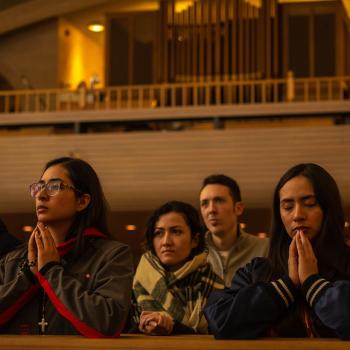Now Featured in the Patheos Book Club
Refuse to Do Nothing
Finding Your Power to Abolish Modern-Day Slavery
By Shayne Moore and Kimberly McOwen Yim
Modern-day slavery is happening right under our noses and yet we often don't see it. Do we know what to look for? What questions do we ask? What do "doesn't seem right" and "something odd" look like?
It's true that we are busy. We run to the carpool line, pick up dry cleaning, go to the grocery store, and we often don't notice the many people we encounter as we go through our days. Despite this, we all have time to call the National Human Trafficking Hotline number if we notice something suspicious: 888-373-7888. Take a minute and enter this number into your cell phone contacts list.
Below is a list of everyday places where slavery has been documented in the United States, as well as signs that someone may be a human trafficking victim. As you read through the list, keep in mind the places and people around your town who work in these types of environments. You may want to mark or copy these pages for future reference. Also, please put the National Human Trafficking Hotline number in your phone and address book: 888-373- 7888. Did we mention this already? Yep, and it is that important.
Where to Look for Slavery
Here are some common places and situations where slavery has been known to flourish:
- Housecleaning services
- Landscape and gardening businesses
- Households in which domestic home workers are present
- Large-scale agricultural operations
- Construction sites
- Casinos
- Garment factories
- Hotels (especially in housekeeping departments)
- Nail salons
- Migrant or transitional communities
- Zones known for prostitution
- Strip clubs
- Massage parlors
- Domestic violence situations
Following are some signs that someone might be a human trafficking victim. Any one of these signs should be enough to raise concern and a reason to call the National Human Trafficking Hotline or local law enforcement. A person might be a human trafficking victim if he or she
- is not free to come and go as he or she wishes
- is not free to change employers
- is afraid to discuss him or herself in the presence of others
- does not control his or her earnings
- is unpaid, paid very little or paid only through tips
- has few or no personal possessions
- is not in control of his or her own money or has no financial records or bank account
- is not in control of his or her own identification documents (e.g., ID, passport, visa)
- is not allowed or able to speak for himself or herself (i.e., a third party insists on being present or interpreting)
- has an attorney that he or she doesn't seem to know or to have agreed to receive representation services from
- works excessively long or unusual hours
- is not allowed breaks or suffers under unusual restrictions at work
- owes a large or increasing debt and is unable to pay it off
- was recruited through false promises concerning the nature and conditions of his or her work
- is living or working in a location with high security measures (e.g., opaque or boarded-up windows, bars on windows, barbed wire, security cameras)
- exhibits unusually fearful, anxious, depressed, submissive, tense, nervous or paranoid behavior
- reacts with unusually fearful or anxious behavior at any reference to law enforcement
- avoids eye contact
- exhibits a flat affect (e.g., doesn't display emotion, seems blank or empty, unresponsive)
- exhibits unexplained injuries or signs of prolonged or untreated illness or disease
- appears malnourished
- is under eighteen years of age and is providing commercial sex acts
- is in the commercial sex industry and has a pimp or manager
- shows signs of physical or sexual abuse, physical restraint, confinement or torture
- has been "branded" by a trafficker (e.g., a tattoo of the trafficker's name)
- claims to be "just visiting" and is unable to clarify where he or she is
- exhibits a lack of knowledge of whereabouts or does not know what city he or she is in
- exhibits a loss of a sense of time
- has numerous inconsistencies in his or her story
In addition, a young person might be caught up in sex trafficking if he or she:
- has unexplained absences from school for a period of time
- is unable to attend school on a regular basisrepeatedly runs away from home
- makes references to frequent travel to other cities
- exhibits bruises or other physical trauma, withdrawn behavior, depression or fear
- lacks control over her or his schedule or identification documents
- is hungry or malnourished and inappropriately dressed based on weather conditions or surroundings
- shows signs of drug addiction




